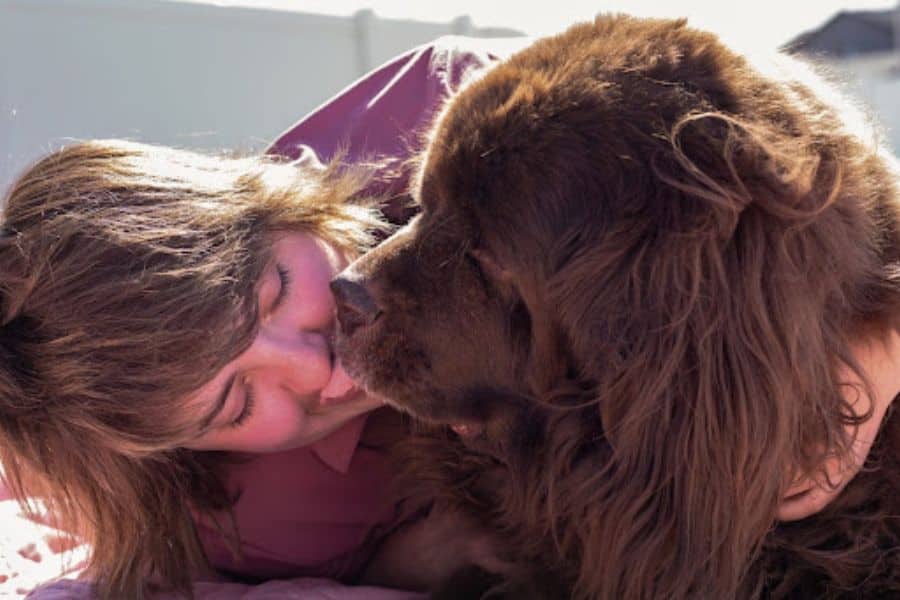Dog parents in Windsor, CO, adore their pups, and nothing feels sweeter than a big, slobbery smooch from your furry best friend. But is it safe to let your dog kiss you on the lips? The answer isn’t as simple as you might think. Let’s explore the science behind dog kisses, when they’re safe, and tips to ensure you and your pup share love in a healthy way.
The Science of Dog Kisses
What’s Really in a Dog’s Mouth?
There’s a popular myth that a dog’s mouth is cleaner than a human’s. The truth? Both are full of bacteria, but they’re completely different ecosystems. A dog’s saliva contains microbes that help them digest food and heal wounds, but it can also carry bacteria and parasites that pose risks to humans.
What Science Says About Risks
Researchers have found that dogs can carry Capnocytophaga canimorsus, a bacteria that, while harmless to dogs, can cause illness in people with weakened immune systems. Dogs may also transfer parasites like hookworms or roundworms if they’ve been exposed to contaminated environments.
Are There Any Benefits?
Interestingly, exposure to certain microbes from pets has been linked to a stronger immune system in children. This doesn’t mean dog kisses are a health supplement, but it highlights the unique bond and positive effects that pets have on human health.
When Dog Kisses Might Be Risky
Situations to Avoid Doggy Kisses
Some situations can increase the risks associated with dog kisses, including:
- After Eating: If your dog has just eaten raw food, garbage, or anything questionable, their saliva could carry harmful bacteria.
- After Exploring Outdoors: Dogs are naturally curious and might lick or sniff unsanitary areas, increasing the risk of germ transfer.
- If They’re Unwell: A dog who is sick may carry infections in their saliva that could pose a risk to humans.
- Immune Compromised Individuals: Those with weakened immune systems, including young children and the elderly, are more susceptible to bacteria or parasites.
What About Allergies?
Even if your dog is healthy, their saliva can be an allergen for some people. Symptoms like itching, redness, or sneezing after contact may indicate a mild allergic reaction.
Why Some Dogs Are Obsessed with Kisses
It’s Not Just About Affection
Dogs don’t kiss the way humans do. Licking is their way of showing submission, bonding, or exploring their environment. When a dog licks your face, they may be tasting sweat, salty skin, or even just seeking attention.
Licking and Stress Relief
For some dogs, licking is a self-soothing behavior. If your pup kisses you obsessively, they may be trying to calm themselves or bond more closely with you.
Safe Ways to Share Puppy Love
Sharing affection with your dog doesn’t have to mean direct kisses on the lips. Here are safer, healthier alternatives for bonding:
Focus on the Cheeks
Encourage your dog to lick your cheek or hand instead of your lips. This reduces the chance of bacteria transfer while still allowing them to express their love.
Use Positive Reinforcement
Train your dog to greet you with nuzzles or gentle paw touches instead of licking your face. Reward them for behaviors you’d like to encourage.
Practice Good Hygiene
Wash your hands after pet interactions, especially before eating or touching your face. Regular grooming for your dog can also reduce bacteria on their fur and paws.
Health Tips for Safe Dog Kisses
Stay Up-to-Date on Vet Visits
Regular vet checkups are essential for your dog’s overall health. Keeping their vaccinations, deworming, and dental care up-to-date minimizes the risks of harmful bacteria or parasites.
Brush Their Teeth
Daily brushing can significantly reduce the bacteria in your dog’s mouth. Invest in a dog-safe toothpaste and make oral hygiene a part of their routine.
Pay Attention to Diet
Feeding your dog a balanced diet keeps their immune system strong and can prevent them from scavenging unsanitary food sources.
What Windsor Dog Parents Are Saying About Doggy Kisses
Many local dog parents have mixed feelings about letting their pups kiss them. Here are some common thoughts we’ve heard:
- “I let my dog kiss me on the cheek, but never on the lips. It just feels more sanitary.”
- “I didn’t realize their saliva could carry bacteria! I’ll be more careful from now on.”
- “We kiss our pup on the nose—it’s a good middle ground.”
We’d love to hear your thoughts too! Are you team “doggy kisses” or team “no thanks”?
When to Seek Medical Attention
In rare cases, dog kisses can lead to infection. Watch out for symptoms like:
- Redness or swelling near the area where you were licked.
- Flu-like symptoms after being exposed to dog saliva.
- Persistent skin irritation or rash.
If you experience any of these, contact your doctor right away.
The Bond Between Dogs and Their Humans
At the end of the day, dog kisses are a symbol of love and trust between you and your furry companion. Whether or not you let your pup kiss you on the lips, the important thing is to cherish the bond you share.
Final Thoughts for Windsor, CO, Dog Parents
Dog kisses can be sweet and heartwarming, but understanding the potential risks ensures that every interaction is safe and joyful. By maintaining your dog’s health and practicing good hygiene, you can enjoy slobbery smooches worry-free—or opt for nose boops and cheek nuzzles instead.Would you like more tips on caring for your dog? Contact your veterinarian or check out our other blogs for Windsor dog parents!





